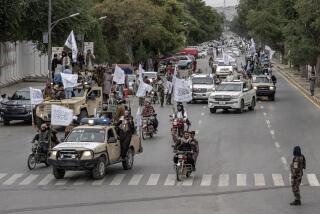First Critical Look at Revolution : Soviet Press Concedes Afghanistan Failures
- Share via
MOSCOW — With the withdrawal of Soviet troops from Afghanistan scheduled to begin in three weeks, the Soviet press is starting to acknowledge the failures of the Kremlin-backed revolution in the country.
The Soviets previously have not engaged in the kind of public hand-wringing that surrounded the American involvement in Vietnam.
Most Soviet officials have been content to express satisfaction with the Geneva accords signed April 14 by Afghanistan and Pakistan, with the United States and the Soviet Union as guarantors. The accords provide for the estimated 115,000 Soviet troops to begin pulling out of Afghanistan on May 15 and to complete the withdrawal in nine months.
The Geneva accords did not include a cease-fire, and the Kabul government still must face seven Afghan guerrilla groups, which have vowed to ignore the Geneva agreement, set up their own transitional government and fight until the last Soviet soldier leaves.
On Tuesday, the 10th anniversary of the so-called April Revolution, when Soviet-backed leftist officers overthrew the regime of President Mohammed Daoud, Afghan Defense Minister Mohammed Rafie told a parade in Kabul that his government is prepared to keep fighting.
“Our army is ready to fight for peace and territory--we will never allow the opposition to put their dirty plan into action,” he said.
Some Doubt Afghan Army’s Ability to Fight
Some observers question whether the Afghan army, which was hard-pressed by the guerrillas even when it was backed by Soviet troops, will be able to survive when the Soviet units are withdrawn.
The Afghan ambassador in Moscow, Mohamadullah Subhani Safi, told a news conference here Tuesday that after Soviet troops leave, he feels sure that Afghan army soldiers “will be able to repulse the bandits.”
But Afghan officials admit there are serious political problems in the country after a decade of Soviet intervention and Marxist leadership.
In an unusually frank interview published Tuesday, the head of the Democratic Youth Movement of Afghanistan, Farid Mazdak, was quoted as saying, “We failed to unite the people under the banner of revolution, but we shall be able to unite people under the banner of peace.”
Even President Najibullah has been engaged in some public soul-searching, telling a gathering in Kabul on Monday--as reported in the Communist Party newspaper Pravda--that taking power proved to be much easier than the other steps of the revolution.
Najibullah criticized party officials for failing to widen the political base of the ruling People’s Democratic Party of Afghanistan. The party was hampered by “factional animosity” and “theoretical immaturity,” he said, adding that it “failed to close the gap between words and deeds.”
More to Read
Sign up for Essential California
The most important California stories and recommendations in your inbox every morning.
You may occasionally receive promotional content from the Los Angeles Times.













